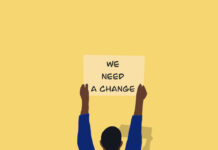A new article, published in the Health and Human Rights Journal, highlights how rights based approaches to mental health can go beyond a narrow focus on improving access to psychiatric treatment in Low- and Middle-Income Countries (LMICs) and create programs that support reintegration into work and social inclusion.
This ethnographic research is founded on the testimonies and lived experiences of people diagnosed with mental illness in Ghana. They shared their experiences of social stigma and the inability to work or maintain employment that negatively impacted their wellbeing. Rights-based approaches to mental health have led to the development of supports the can promote the rights of people with psychosocial disabilities as outlined in the United Nations Convention on the Rights of Persons with Disabilities (CRPD).
The study was led by the anthropologist Dr. Ursula Read from Kings College London alongside Lionel Sakyi of the University of Ghana and Wendy Abbey a from the JSI Research Training Institute in Ghana.
“In many societies, working and contributing to household income and the wider community is an important milestone in gaining social status and respect,” Read and her co-authors write. “From a rights-based perspective, the argument is not to simply increase the productivity (and by correlation reduce the welfare dependency) of people with mental illness but to ensure fair pay, safe and flexible working conditions, and equal opportunities as beneficial for all.”

The United Nations and, recently, the World Health Organization have emphasized the importance of addressing the social determinants and mental health, including the ability to work and find stable employment. Although a focus on work in mental health risks contributing to neoliberal messages that equate productivity with health, having access to a stable income and the ability to provide for oneself and loved ones is beneficial to overall wellbeing and self-esteem.
“The economic rationale for scaling up mental health treatment has emphasized the lost productivity of people with mental health problems and implications for growth and development. Efforts to improve access to work thus risk being reduced to arguments for a ‘return on investment,'” the authors write.
“Furthermore, this approach may leave behind those most affected by severe mental illness (such as psychosis) and overlook the potential harms of poor working conditions on mental health. This includes precarious employment, overwork, and unsafe working environments. Nonetheless, for many people, meaningful work and being able to provide for oneself and one’s family is inherent to a sense of well-being and identity.”
Minimal research exists on the relationship between work and mental health in LMICs. For this reason, the authors conducted ethnographic research in the capital of Ghana, Accra, as well as in Kintampo North and South in the Bono East region.
Two groups of participants were interviewed (15 total), in either English or Twi, about the meanings of, opportunities for, and barriers to social inclusion. The interviews were recorded and transcribed. Afterward, these transcriptions, with their accompanying field notes and visual data, were triangulated, and emerging themes were developed inductively and summarized and coded. The authors took careful consideration with anthropological theories that are sensitive to intersectionality.
The results of the study found that nearly all participants reported challenges in finding work and remaining employed. In addition, some participants described being dismissed from work after experiencing a deterioration in their mental health.
“And then I had a crisis there. I don’t really remember everything. They said I broke the glass, the louvre pane. So when like I came to normal the school governors were like, if it should happen again, they would sack me. So it didn’t happen again; I was working alright. But sometimes then I felt a sharp pain in my head, a very sharp pain. So they took me to the hospital. So when we came back, then they told my husband that I should stay home and take care of myself. But I didn’t know they’ve sacked me. So when I became ok after about two weeks I was at home, then the following, the third week I went back to work. And that very day they told me that they have taken someone else and that they have told my husband I should stay home and take care of myself, they have taken someone in place of me.”
Read and colleagues use this anecdote to illustrate the intersection of structural factors affecting mental health and social inclusion. And, for those who were self-employed and in ‘informal work,’ which accounts for much of Ghana’s working class, ‘stigma and discrimination can also affect social inclusion and opportunities to earn a livelihood.’ All of which negatively impact mental health and feelings of self-worth and belongingness.
However, human rights legislation in the area may be able to remedy these issues, the authors argue. Indeed, many people with mental disorders do not know that they have certain rights.
“People with mental disorders themselves do not know that they have a certain right. So once they don’t know, or even if it’s trampled upon it, they don’t even know that such a thing has happened because they don’t know what it means, or they don’t know what constitutes it. So if there’s a violation and a breach, he doesn’t have an idea! It is somebody who can draw his attention or your attention, that look this thing that was done to you, you could go to the court and get judgment or something,” An NGO worker in Ghana said.
However, it remains difficult for people with psychosocial disabilities and mental illness to know they have these rights outlined in the CPRD because too much attention is paid to care rather than work.
“…Ghana has become a significant focus of activities that aim to promote the rights of people with mental illness, including ratification of the CRPD.44 However, while the human rights community has focused on abuses by traditional and faith healers, as we have shown, rights to social inclusion and participation in the workplace are routinely contravened. Political leaders in Ghana have not been held to account for their failure to implement the CRPD and protect the rights of some of their most vulnerable citizens. The emphasis is often on individual stigmatizing behavior and “harmful cultural practices” rather than on challenging the ways in which discrimination is embedded into social and political structures.”
****
Read, U. M., Sakyi, L., & Abbey, W. (2020). Exploring the potential of a rights-based approach to work and social inclusion for people with lived experience of mental illness in Ghana. Health and human rights, 22(1), 91. (Link)















Until forced psychiatric treatment is made illegal, there will be nothing “rights based” about the “mental health” industry. Psychiatry and psychology today are all about trying to take, and taking away people’s rights, lying to people, defaming people with “invalid” disorders, coercing and forcing neurotoxic drugs onto innocent others, and trying to steal from others, with conservator contracts. What is “rights based” about any of this criminal behavior?
Report comment
Sometimes, it is very difficult to compare what happens in Ghana versus the USA and if a certain program that works in one nation will work in another. However, the concepts of rights in mental health care is nothing but a lie. Actually, the idea of mental health and conversely mental illness is nothing but a lie. There are all kinds of reasons that this lie has been perpetuated across many countries and many cultures and many have been mentioned by others who post on this site in response to other articles. In the US, we have things like Vocational Rehabilitation, Supportive Employment, Adult Daycare and Sheltered Workshops. There are probably others of which I am unaware. I have been involved in the above four mentioned. What is true about these is that they reinforce the concept that one is defective and needs help in some manner. In all kinds of messaging, some outright; some subliminal, the psychiatrists, etc. seek to reinforce that you are defective in some way. This is not like the idea of sin in the Christian religion; for at least you can be saved. The drugs, the therapizing and all this other stuff is in no way to “save” you. It is to keep you “under the thumb” and constantly remind how defective you are. And no matter what you do, in their eyes, you will always be defective. No wonder, the “mental health patient” is subject to prematurely dying 25 years earlier. It is imperative to end psychiatry, etc. because one of its many evils is to define you always as defective. Thank you.
Report comment
The title suggested to me that the point of the study would be that everyone should have equal rights to have their human rights abused by a psychiatrist.
Maybe African psychiatrists don’t go around abusing their patients like American ones do, but still, is this the real answer to the problems some people have at keeping their jobs? Why don’t more psychiatrists have more problems keeping their jobs? I would guess most of them have severe mental illness.
Truth is, no employer wants to deal with an employee that is always having problems. It would be great if there were more effective treatments for such people, because then they could more easily hold a job. Barring that, the only effective handling I have seen has been to create some sort of community-based program where people can go and contribute at their ability level and get some sort of recompense so they are seen as useful community members. The general public can also be trained to deal with these problems in a more understanding way.
The tragedy, of course, is that there ARE more effective treatments for people with problems. They just aren’t normally provided by psychiatrists.
Report comment
The issue with people having problems at work is usually a mismatch problem. It is usually a person whose natural talents and gifts are being wasted; while the person must struggle against the current of their natural self and then must try to achieve in their areas of weaknesses or non-strengths. It is usually when they are in areas that they are not naturally motivated to perform. It is an uphill battle and probably causes the most stress and eventually does lead to all kinds of health issues. It may be the one thing that helps to cause health costs to rise. And, it is so obvious that many want to deny it. Part of the reason is that there is so much vested interest in keeping the very organizations and etc. that benefit from these stress-related and other illnesses; so we avoid really finding any “cures” or as in the case of psychiatry, etc. pummeling the vulnerable with lies, drugs, therapies, that both useless and dangerous, leading to premature death for an unknown amount of people. This is one of the tragedies that stays hidden just below the surface like that snake that lives under your front stoop. Thank you.
Report comment